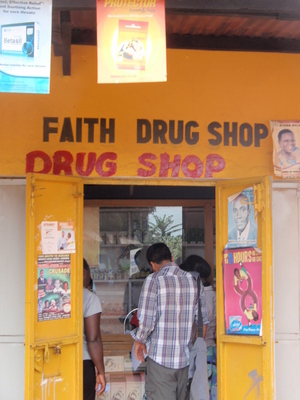Malaria testing not a simple fix in the private sector
21 March 2014

Drug shops offering quick diagnostic tests for malaria can improve treatment, but regulation by authorities is also needed, researchers warn.
Malaria rapid diagnostic tests (RDTs) are simple tools to diagnose malaria accurately and can help health workers in remote locations to prescribe the correct treatment. But introducing RDTs into the private sector may have complex, unexpected consequences for patients.
In this study, published in Critical Public Health, social scientists investigated the relationships between drug sellers, their clients and local health workers within an ACT Consortium trial that introduced RDTs into drug shops in Uganda for 18 months.
The trial aimed to reduce the over-diagnosis of malaria and over-prescription of malaria drugs, to target the treatment at those who had a confirmed diagnosis of malaria. Drug sellers received training on how to use RDTs and were given supplies for their shops.
Beyond the improvement of treatment
The trial found that the use of rapid diagnostic tests by drug shops did improve malaria treatment, but the social science research reveals that the introduction of malaria testing cannot be seen as a simple fix – as RDTs don’t prevent other inappropriate practices in drug shops.
“Many people who visit these shops believe they’ve been treated by someone whose services are being supervised and regulated by the government,” explains one of the authors, Dr Eleanor Hutchinson from the London School of Hygiene & Tropical Medicine. “But, if the shops are not subject to regular controls, there is a risk that they may continue to provide other medical services (like injections) illegally.”
Rapid diagnostic tests make shops more attractive places to seek care
Introducing RDTs into the private sector in countries like Uganda makes these shops more attractive places to search for health care. Clients welcomed the availability of tests in drug shops and considered it a sign of good quality care.
However, when vendors referred sick patients on to health centres and hospitals, the referral was not always taken up adequately.
Health workers were concerned that authorising drug shop vendors to use RDTs could enable untrained and untrustworthy personnel to appear to be part of the Ugandan health service.
Training drug sellers makes them appear more legitimate
Many participants believed that the training and authorisation of drug shops to use the tests, along with supervision from field workers during the trial, made shops more legitimate. This raises the concern that the use of RDTs can give the false impression that drug shops are a fully regulated part of the Ugandan health services.
Hutchinson says: “If the government and other agencies wish to place these pin-prick blood tests for malaria in drug shops in Uganda, they would also need to strengthen the regulatory system, with regular supervision and effective government control, as well as stronger linkages with the public health system to encourage referral.”
Further information
- Read the article “‘It puts life in us and we feel big’: shifts in the local health care system during the introduction of rapid diagnostic tests for malaria into drug shops in Uganda” (Critical Public Health)
- Read more about the social science study “Perceptions and impact of introducing rapid diagnostic tests in drug shops”
- Read more and watch a video about the trial “Introducing rapid diagnostic tests in drug shops to improve the targeting of malaria treatment”

